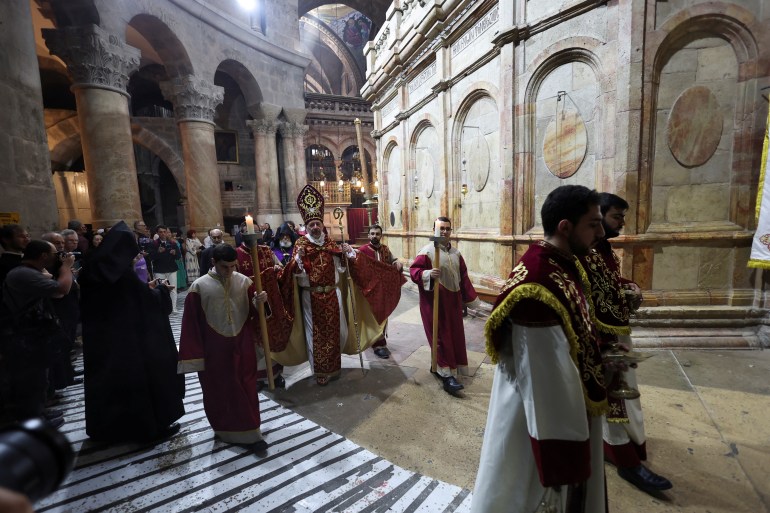Palestinian Christians in Gaza, the occupied West Bank and Jerusalem have marked a second sombre Easter under punishing conditions and Israel’s war on Gaza.
In the Gaza Strip, where no food or aid has been allowed in by the Israeli military for nearly 50 days, people observed Easter on Sunday at the Greek Orthodox Church of Saint Porphyrius in Gaza City amid death and destruction.
Easter celebrations were limited to religious rituals as families cancelled other gatherings fearing more bombs would be dropped by Israeli warplanes, which killed dozens of people in the besieged enclave on Sunday.
Israeli forces bombed the Saint Porphyrius compound in October 2023, just days after the war began in the aftermath of Hamas-led attacks on Israel. Israel said it was targeting “terrorists”.
That attack killed at least 18 displaced Palestinians who had sought refuge in the church. More than 51,000 Palestinians have been killed by the Israeli army since the start of the war.
During a brief appearance before thousands of Catholic pilgrims gathered in St Peter’s Square for the Vatican’s open-air Easter Mass, Pope Francis renewed his call for a ceasefire in Gaza.
He also called on the Palestinian armed group Hamas and other groups to release the remaining captives held in Gaza.
Heavy restrictions in occupied West Bank
Israeli authorities prevented many Christians, including Palestinians, from accessing holy sites for Easter in the occupied West Bank.
Israeli police clashed with Christian worshippers and even a priest as they tried to access the Church of the Holy Sepulchre in occupied East Jerusalem.
The Old City of Jerusalem was in effect turned by Israeli authorities into a military outpost, said Fathi Nimer, Palestine policy fellow at the Al-Shabaka think tank.
“Some would say that there are now more soldiers, security and police officers than worshippers around the Holy Sepulchre,” he told Al Jazeera from Ramallah in the West Bank on Sunday.
“There are dozens of checkpoints within the city, and these limitations have not only impacted Palestinian Christians from the West Bank but also from Jerusalem itself and within the 1948 territories.”
Nimer said people were beaten, and Israeli officers and onlookers directed insults and slurs towards Christians.
Only about 6,000 Palestinians from the West Bank received permits to attend Easter services this year, and even the representative of the Vatican in Palestine was denied entry into the church.
Nimer said a tightening Israeli chokehold over holy places in the past few years has led to a dwindling number of worshippers of Palestinian origin.
“This is all part of the wider war on Palestinian culture and identity. Israel is basically saying they have an exclusive claim to Jerusalem and all of Palestine,” he said.
‘I don’t have a permit to go as a pastor’
Mitri Raheb, a Palestinian pastor and theologian and founder and president of Dar al-Kalima University in Bethlehem, concurred that current Israeli restrictions are among the toughest.
“I myself as a pastor don’t have a permit to go for the Holy Week, which is the most important week for Christians throughout the year because Jesus was crucified and risen in Jerusalem,” he told Al Jazeera.
“The Palestinian-Christian community that has been there for 2,000 years cannot go there to celebrate and mark this where it all happened.”
Raheb said incitement against Palestinian Christians, especially clergy members, has also been on the rise with dozens of incidents of Israeli settler attacks reported this year.
“One of the first things you read about in church about Jesus is that he was like a lamb led to the slaughter. But when you hear this today as Palestinian Christians, you think it’s our whole people being led to slaughter, considering what is happening in Gaza.”
Israeli settlers and politicians, backed by armed police and soldiers, have also been increasingly storming the Al-Aqsa Mosque compound to perform Talmudic rituals and challenge its status quo.
Non-Muslims are not allowed to worship at the compound of Islam’s third holiest site, which is located in East Jerusalem, as part of the status quo agreement that the Israeli government claims it remains committed to.
Pope Tawadros II, head of Egypt’s Coptic Orthodox Church, strongly condemned the Israeli onslaught on Gaza.
“Palestinians are subject to the most horrific forms of injustice in their daily lives amid the destruction of their homeland,” he told state television during Easter celebrations.
